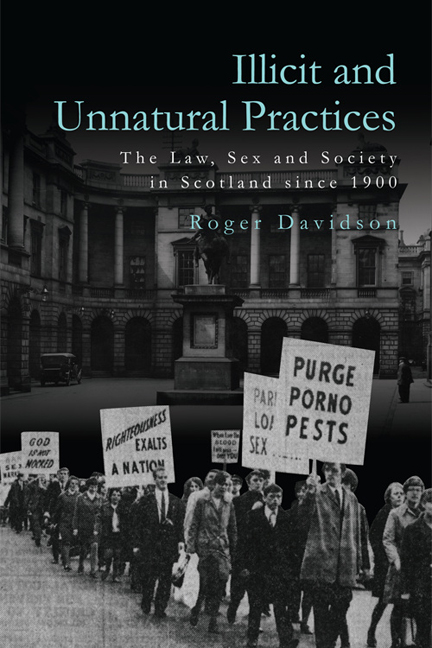Book contents
- Frontmatter
- Contents
- List of Figures and Tables
- Acknowledgements
- List of Abbreviations
- 1 Introduction
- 2 ‘Venereal Trouble’: The Case of ‘Professor’ Abraham Eastburn
- 3 ‘This Pernicious Delusion’: Law, Medicine and Child Sexual Abuse
- 4 ‘Unnatural Carnal Connection’: Bestiality and the Law in Early Twentieth-century Scotland
- 5 ‘There’s the Man who Shifts the Babies’: Abortion in the Scottish High Court, 1900−30
- 6 ‘An Open and Notorious House of Lewdness’: Dora Noyce and the Danube Street Brothel
- 7 Cure or Confinement? Law, Medicine and the Treatment of Homosexual Offenders in Scotland, 1950−80
- 8 ‘Liable or Likely to Deprave and Corrupt the Morals of the Lieges’: Sex Shops and Moral Panic in Late Twentiethcentury Scotland
- 9 ‘Culpable and Reckless Conduct’: Criminalising the Transmission of HIV in Scotland, 1983−2014
- 10 Conclusion
- Sources and Select Bibliography
- Index
10 - Conclusion
Published online by Cambridge University Press: 23 April 2021
- Frontmatter
- Contents
- List of Figures and Tables
- Acknowledgements
- List of Abbreviations
- 1 Introduction
- 2 ‘Venereal Trouble’: The Case of ‘Professor’ Abraham Eastburn
- 3 ‘This Pernicious Delusion’: Law, Medicine and Child Sexual Abuse
- 4 ‘Unnatural Carnal Connection’: Bestiality and the Law in Early Twentieth-century Scotland
- 5 ‘There’s the Man who Shifts the Babies’: Abortion in the Scottish High Court, 1900−30
- 6 ‘An Open and Notorious House of Lewdness’: Dora Noyce and the Danube Street Brothel
- 7 Cure or Confinement? Law, Medicine and the Treatment of Homosexual Offenders in Scotland, 1950−80
- 8 ‘Liable or Likely to Deprave and Corrupt the Morals of the Lieges’: Sex Shops and Moral Panic in Late Twentiethcentury Scotland
- 9 ‘Culpable and Reckless Conduct’: Criminalising the Transmission of HIV in Scotland, 1983−2014
- 10 Conclusion
- Sources and Select Bibliography
- Index
Summary
The most notable contrast between the early and late twentieth-century studies in this volume is the degree of exposure of ‘illicit and unnatural’ sexual practices in the press. As the early chapters illustrate, except for cases involving prominent local personalities, such as the well-known VD quack, ‘Professor’ Abraham Eastburn, or the abortionist, Professor George Bell Todd, there was very little newspaper coverage of trial proceedings in the period 1900−30. Indeed, as late as 1950, this silence which, as Foucault has observed, constitutes a powerful discursive practice, continued to prevail in the Scottish press. Law reports continued to excise explicit details of offences, such as the sexual practices performed or depicted in film and literature. In contrast, although the social historian of sexuality is severely restricted in access to late twentieth-century Crown Office and High Court records, newspaper coverage in part compensates for this. Details of cases involving sexual offences were fully reported, often with sensational headlines and explicit discussion of intimate sexual practices and preferences. Indeed, in some instances, as with the madam, Dora Noyce, and the sex-shop owner, John Cameron, sexual entrepreneurs exploited this media coverage to their own advantage. Furthermore, as in the cases of brothel-keeping, sex shops and the wilful transmission of HIV, detailed exposure of court proceedings in the press not only reinforced the moral panic that had initiated legal action in the first place but served to strengthen the call for additional measures to regulate and/or penalise such practices.
At the same time, there are significant areas of continuity. A number of important aspects of the relationship between the law, sex and society recur throughout the volume. One outstanding feature of the case studies is the degree to which the legal process, far from being autonomous, was very much a social construct. In many instances, the law both reflected and reinforced contemporary moral concerns that occupied public and professional debate. For example, the prosecution of ‘Professor’ Eastburn was a product of the moral panic surrounding VD during and immediately after World War I, and of lobbying by the social hygiene and social purity movements.
- Type
- Chapter
- Information
- Illicit and Unnatural PracticesThe Law, Sex and Society in Scotland since 1900, pp. 201 - 207Publisher: Edinburgh University PressPrint publication year: 2018



